At the annual “Light Up the Night for Peace” event on Dec. 14, people murmured the names of loved ones lost to gun violence.
They lit candles in the sanctuary of Church of the River for the more than 300 people who have been killed so far in 2023 in Memphis, individuals ranging in age from just 3 to 80.
It wasn’t supposed to be this way. Back in 2015, the year before Mayor Jim Strickland took office, Memphis saw 135 cases of murder and nonnegligent manslaughter, according to data from the Federal Bureau of Investigation.
During his campaign that year, Strickland promised “violent crime will be reduced.”
Instead, as Strickland terms out of office after eight years, Memphis has seen an increase in homicides and property crime, even as violent crime trends down across the majority of the country. As of Dec. 15, Memphis has seen 382 homicides in 2023, compared to 281 homicides total in 2022, according to Memphis Police Department data.
Not only has crime not decreased, but Strickland also failed in his promises to add more police and to collaborate with others working on crime prevention. And when he speaks about the city, it’s often with a focus on the negative, including laying the blame for high crime rates on others.
In his weekly newsletter and in media appearances, Strickland, who planned to be “brilliant at the basics,” acknowledged his inability to decrease crime in Memphis. Often, those appearances have included criticisms of the courts, the recently elected district attorney or state law, with Strickland pointing to those as causes of ongoing crime.
In response to multiple requests to interview the outgoing mayor, Strickland’s team asked MLK50 to send a list of written questions. The city did not respond to those questions. Strickland has regularly refused to speak with MLK50 throughout his tenure.
Several Memphians who did speak to MLK50 said they hope that Mayor-elect Paul Young, who will be sworn in Jan. 1, will approach crime in a way that’s more collaborative and emphasizes the good in Memphis while being realistic about the city’s problems. That approach, coming from the city’s top leader, could lead to increased investment and hope in the city, they said.
That kind of change would mean something to those at Church of the River and other Memphians. Just hours after the event, there was a mass shooting in southeast Memphis. Two people died, and three were taken to the hospital in critical condition.
‘Arresting’ the way out of crime
“The data says that we are making progress and I believe that we would have made more progress if we would have had more police,”
Strickland, Sept. 2019.
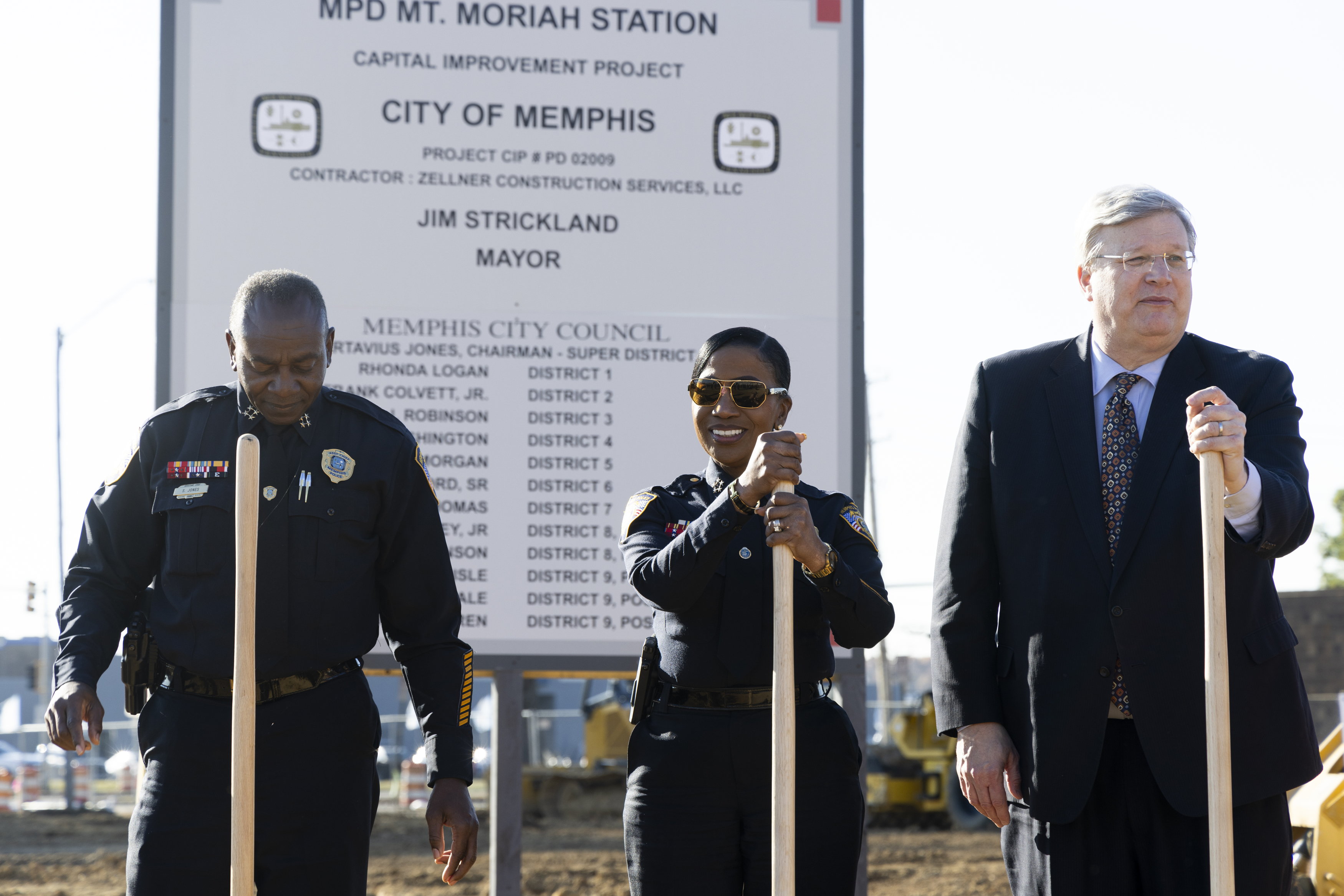
Strickland has had some successes, both directly related to public safety and further upstream. Those wins include reducing the time it takes to answer 911 calls from an average of 98.5 seconds in 2015 to the industry standard of answering more than 95% within 20 seconds, increasing attendance in teen programming at libraries by 33% over 2022 and opening and renovating community centers across the city. And, in a move meant to impact crime down the road, Strickland’s administration began funding universal, needs-based pre-kindergarten, in partnership with Shelby County government in 2019, starting with $6 million annually.
While Strickland’s efforts to increase the police force slowed the hemorrhaging, the force today is smaller than when he took office, a decline in keeping with national trends. In 2015, Memphis had more than 2,100 commissioned police officers, fewer than in previous years. At Strickland’s behest, the city increased funding for MPD by over 20% and pay for officers by 30.75-32.75% over eight years. The current goal listed by the city is to have 2,300 officers, although Strickland has touted the need for up to 2,800.
At first, the efforts increased the force from about 1,900 to almost 2,100, prior to the pandemic.
But the approach hasn’t worked, with numbers dropping to 1,957 as of Dec. 17 and crime continuing to rise.
Under Strickland, Memphis is trying to “arrest or punch” its way out of crime, said Thaddeus Johnson, a former member of the MPD who is now an assistant professor at Georgia State University, where he researches police policy and racial disparities.
Other cities use hotspot policing but offer food, health care and mental health services in those “hotspots” rather than merely targeting them with arrests, Johnson said.
In Memphis, however, the city “relie(s) on police to arrest their way out of it, prosecutors to prosecute their way out of it and nonprofits to do social services without really supporting them,” he said.
Strickland wrote, in an August 2023 newsletter, that “recruiting and retaining quality police officers for the Memphis Police Department has been a top priority for our administration from day one.”
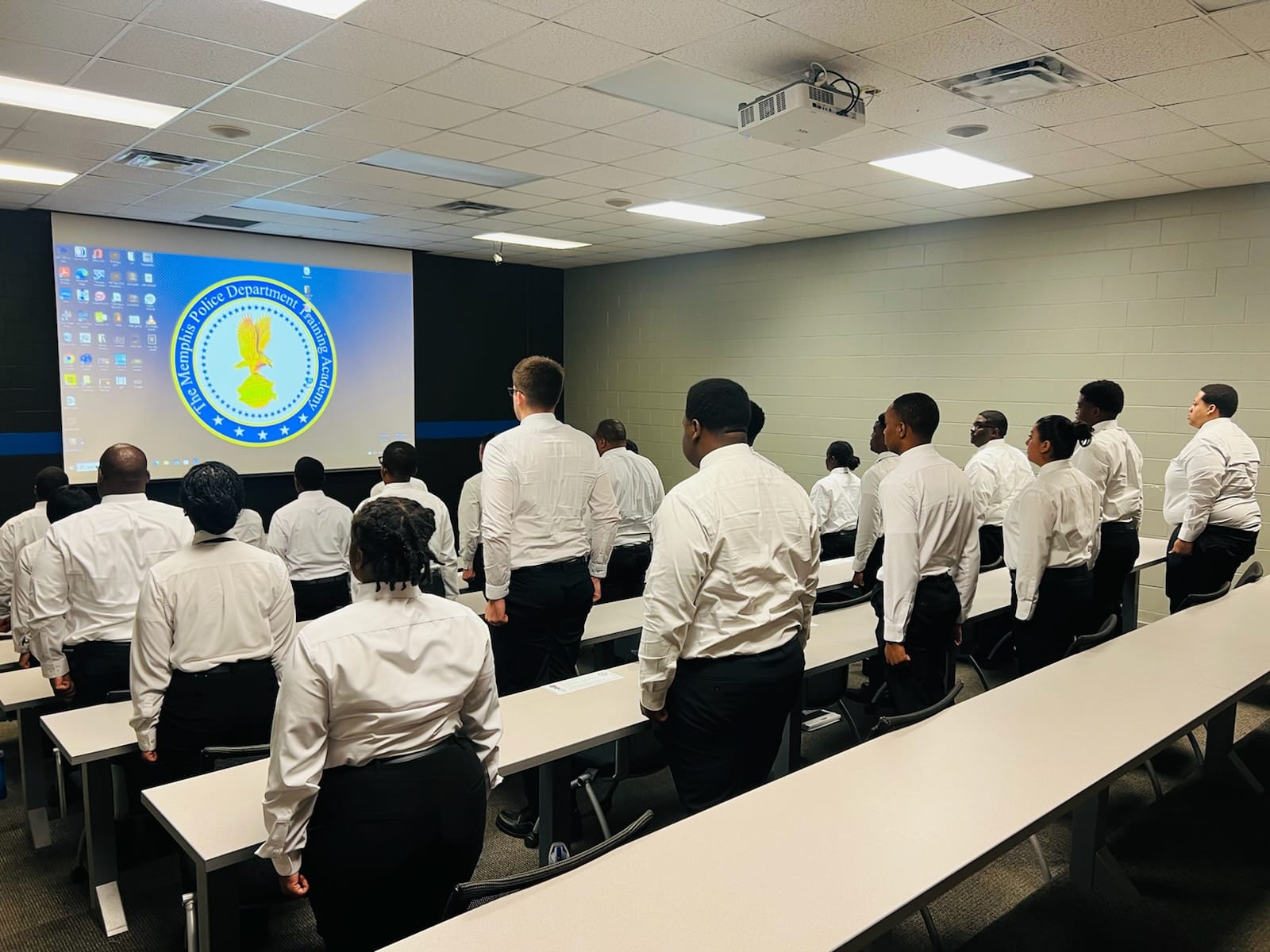
Yet it’s unclear how he defined “quality.” To attract more officers, the city lowered standards requiring college credits, military service or previous police work and offered signing bonuses to the tune of $15,000. Even with those changes, the target goal of 2,300 was never reached.
Altering standards is controversial, Johnson said: Studies show college-educated officers are less likely to kill people in general, including Black people. However, in cities requiring a college education, Black people are still five times more likely than white people to be arrested.
“If you have the right people there but don’t have the right organization, reward structures to fit the people you’re bringing in, then guess what? You’re going to have the same damn issues or even worse issues,” he said.
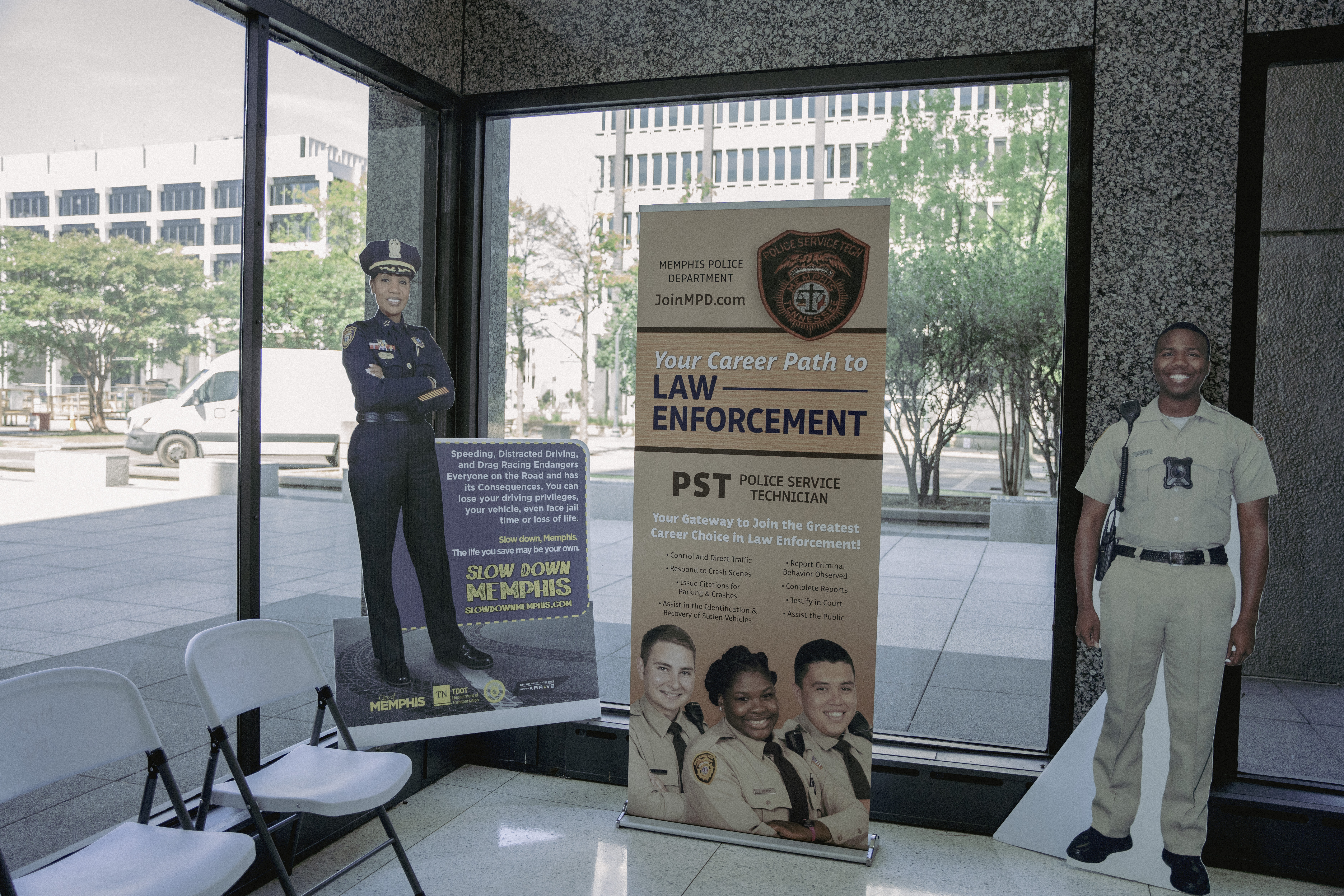
As part of the effort to tackle rising crime rates in Memphis, Strickland and his new police chief, Cerelyn “C.J.” Davis, created the Street Crimes Operation to Restore Peace in Our Neighborhoods unit, whose officers included the men who beat Tyre Nichols, the 29-year-old Black man who died Jan. 10, three days after being brutally beaten by Memphis police officers during a traffic stop. After Nichols’ death, the unit was disbanded.
Strickland hired Davis in 2021. The hiring of a Black woman police chief from outside Memphis was treated as a sign of hope. However, Davis faced scrutiny for commanding a drug enforcement unit in Atlanta called Red Dog, which was disbanded after her departure due to accusations of police brutality.
Strickland promoted the unit in multiple newsletters, praising high arrest numbers, including 566 arrests between its creation in October 2021 through Jan. 23, 2022.
That number of arrests should have set off “bells and whistles” among leadership, said Timothy T. Williams Jr., a former officer with the Los Angeles Police Department who specializes in use of force and wrongful convictions.
The officers charged in Nichols’ death were young, none with more than six years on the force.
“You do not lower your standards to get more police officers in the department,” Williams said.
In announcing its civil pattern or practice investigation this past July, Department of Justice representatives referred to multiple allegations of racial discrimination and a “dangerously aggressive approach to traffic enforcement” by MPD.
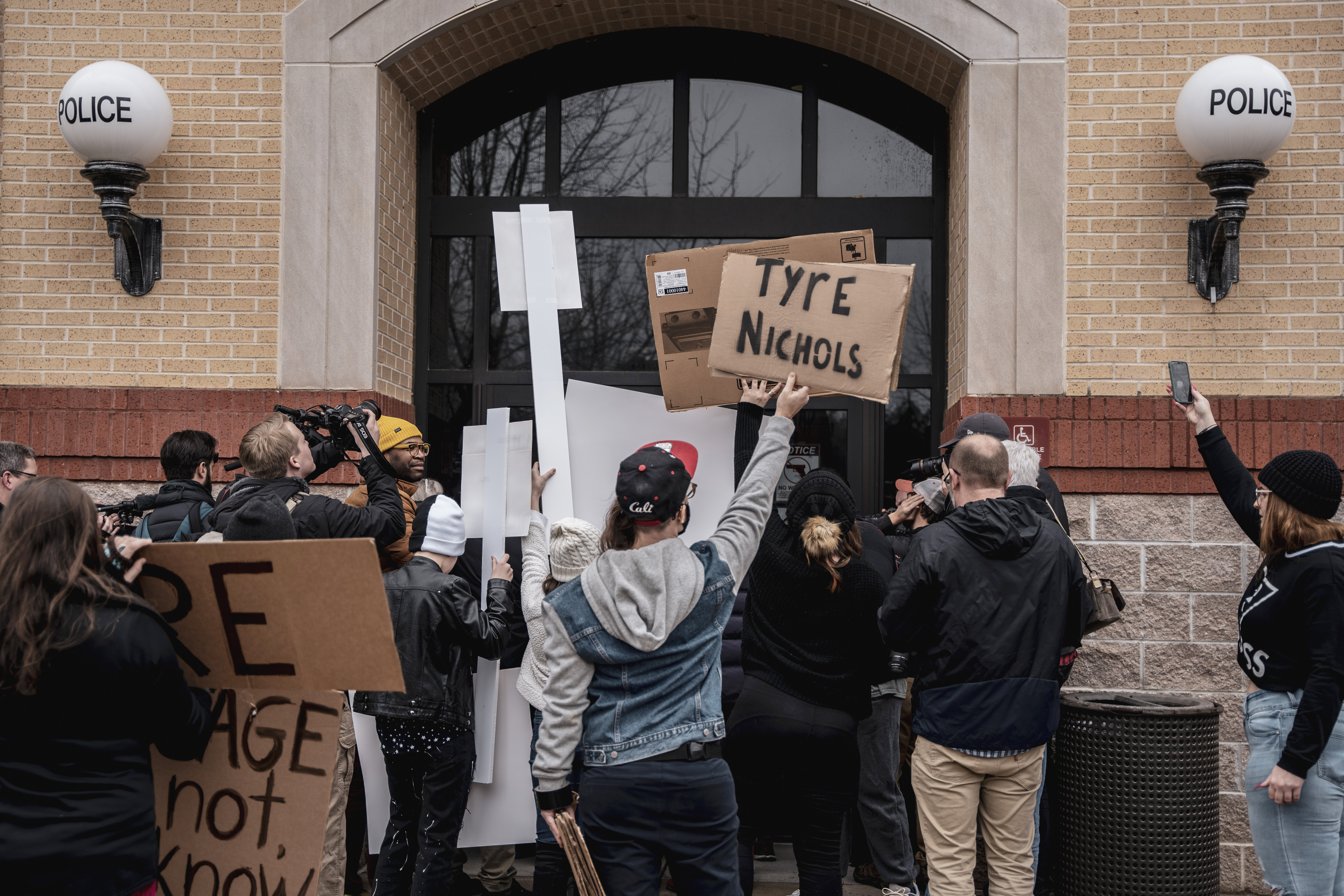
There is a separate federal criminal civil rights investigation related to the death of Nichols. Five officers have been charged in his death.
Even as the DOJ investigates MPD, it has acknowledged that crime-fighting efforts in Memphis aren’t working. In November, the DOJ announced a “surge of resources” to combat violent crime.
In a reflection at the Light Up the Night for Peace event, the Rev. Earle J. Fisher, pastor of Abyssinian Missionary Baptist Church, spoke about the shooting death of a 21-year-old member of his church.
No public officials attended the young man’s funeral, Fisher said. But, if they had, it wouldn’t have been to offer real solutions to crime but to promote talking points about “pouring millions of dollars into the same systems and structures that cause so much pain and death they require a pattern and practice investigation of the Department of Justice.”
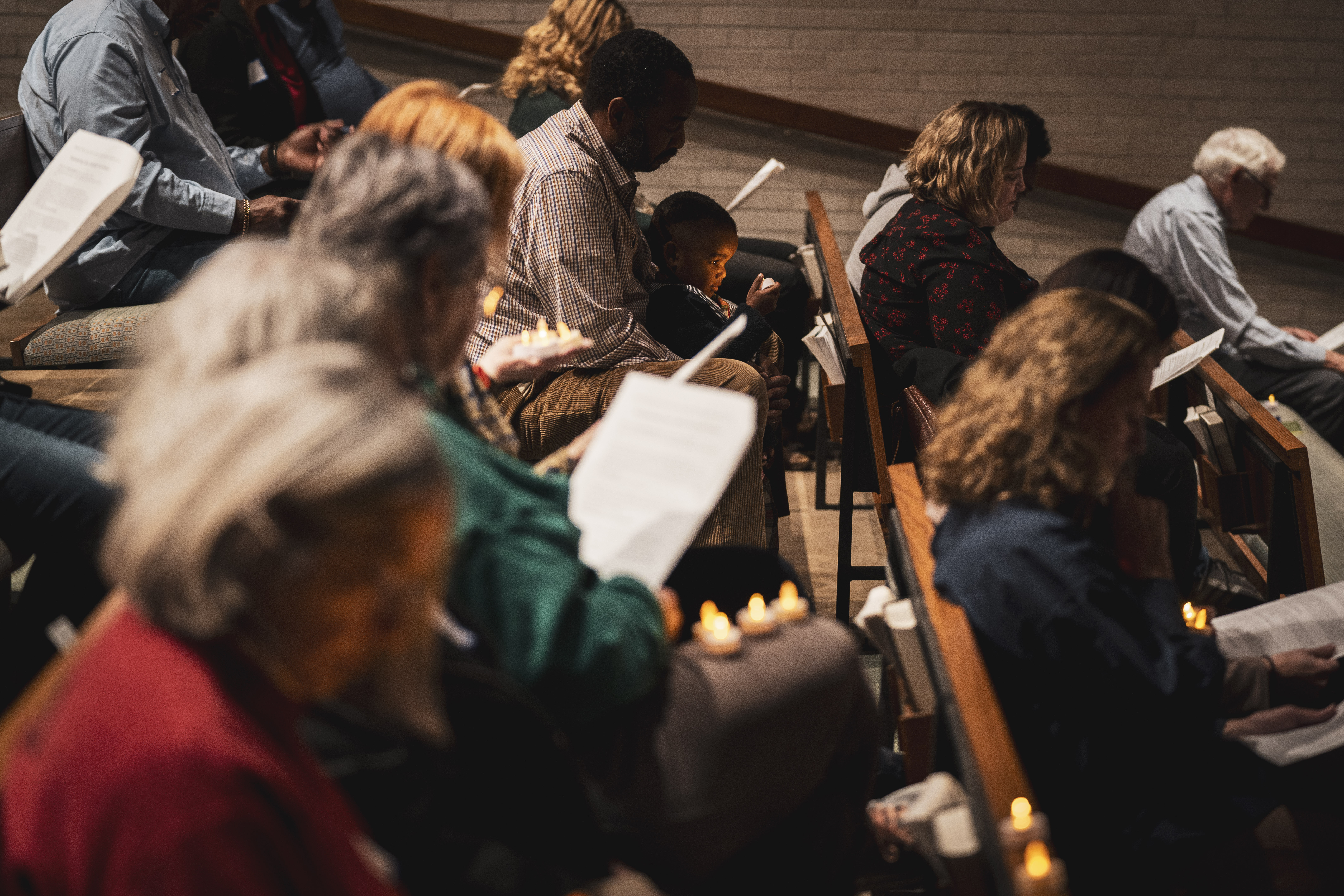
A ‘go it alone’ strategy
“While I embrace being held primarily accountable for reducing crime as Mayor of Memphis, City government is only one piece of this very complex puzzle,”
Strickland, Sept. 22, 2023 newsletter.
Some of Strickland’s efforts to curb crime were stymied by the COVID-19 pandemic and increasingly lax state gun laws. Other initiatives have seen progress, but some experts in crime prevention have criticized Strickland for taking a “go it alone” strategy.
While the city has funded prevention and intervention efforts, it has also decreased work with others working to address the issue. That means Strickland’s administration was trying to solve the problem as a solitary puzzle piece rather than fitting in with the rest of the pieces.
The city’s primary prevention efforts come through Manhood University and Women Offering Women Support. By the summer of 2022, more than 1,000 men had graduated from Manhood University, which launched in 2016, and 277 women had graduated since WOWS was started in 2019.
In launching Manhood University, a life skills program for former offenders, the city ceased funding the Memphis-Shelby County Office of Re-Entry. That office interacts with every justice-involved person in Shelby County, from people on probation to those recently released to those just arrested.
The city also reduced its funding to the nonprofit LifeLine to Success from $200,000 to roughly $42,000 around 2018, then stopped contracting with the agency about two years ago.
“After attending the national violence reduction summit in Indianapolis, it only deepens my belief that Memphis lacks coordination in its efforts to reduce violent crime,” said DeAndre Brown, who emphasized he was speaking on his behalf, not as founder of Lifeline to Success or director of Shelby County Office of Re-Entry.
Other leaders have voiced similar concerns, including Stevie Moore of Freedom From Unnecessary Negatives and Jeffery R. Futrell, president of Young Man University.
Moore, who considers Strickland a friend, said the city stripped some of his organization’s funding after new rules were implemented, rules never communicated to him. FFUN works with at-risk youth and young adults to deter crime. Moore launched the organization after the killing of his son, Prentice Moore, in 2003.
The city did not answer a question from MLK50 about changes in funding requirements.
Futrell, who has received national awards for his work, said efforts to work with the mayor’s office were unsuccessful since he is “not in a political loop or a religious loop.”
“(The city) has a right to do business with whoever they want to do business with, but I think, if you produce results, that should trump politics and religion,” Futrell said. “Silos don’t work.”
At Mount Pisgah Christian Methodist Episcopal Church in Orange Mound, the Rev. Willie Ward pointed out bullet holes in the walls, office windows and stained glass of the sanctuary.
He estimated in the 16 years he’s worked at the church, its buildings have been hit by gunfire five times, several during the past eight years. Recently, the church has invested in two security guards, one armed, and placed new fencing on parking lots and security doors on entrances.
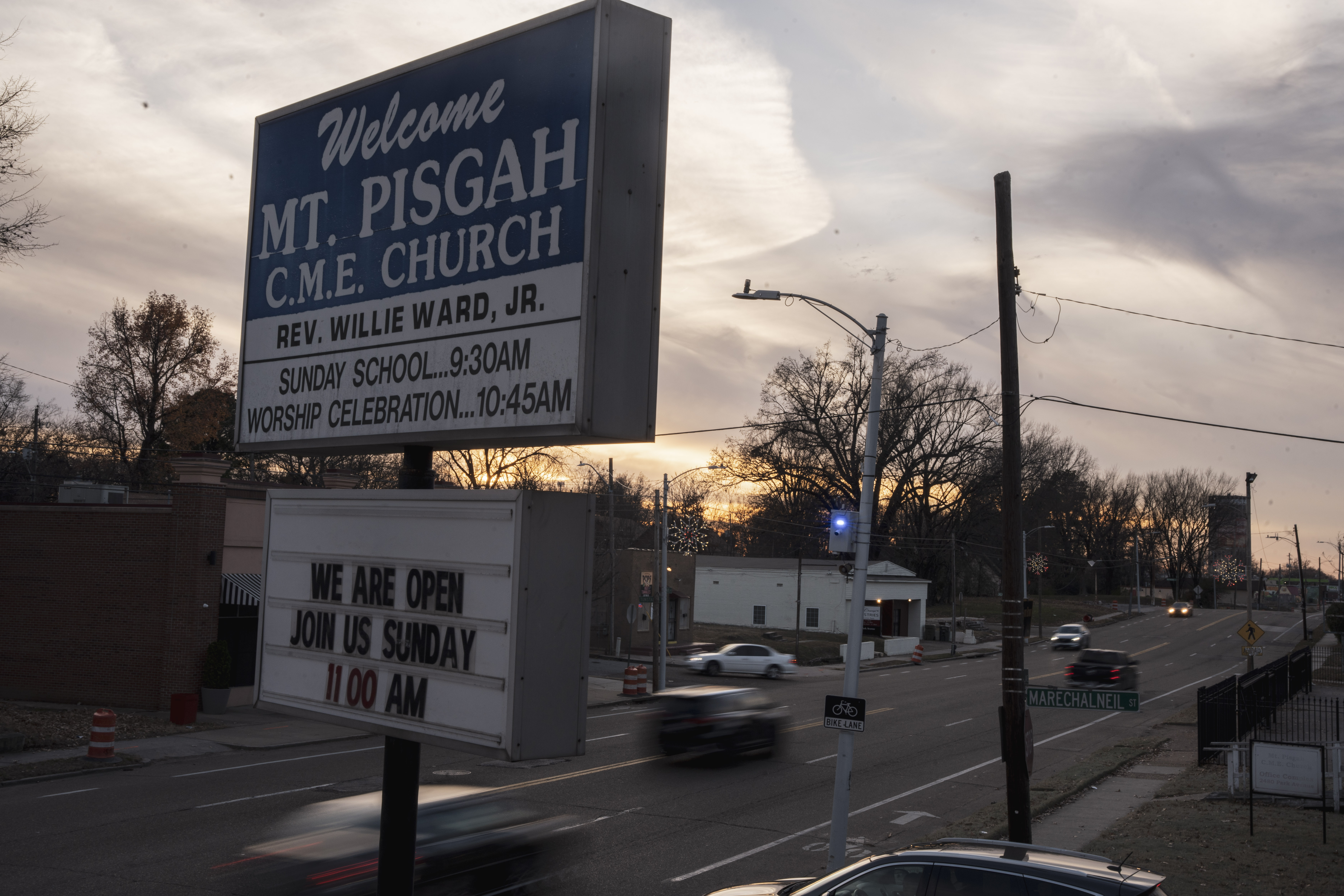
A Strickland supporter, Ward said lax state gun laws are “like pouring gasoline on a fire.”
Since Strickland took office, the state has allowed people to carry guns without a permit, dropped the minimum age for permitless carry to 18 and allowed people to keep guns in cars, all actions opposed by the mayor.
As for Strickland’s initiatives, Ward said he’s seen the results of Manhood University in the lives of former offenders who now have good jobs, transportation and stable lives.
“This city is in turmoil, but what city is not?” Ward said. “We’ve got to figure out how we’re going to address it together.”
In the fall of 2022, the city launched its Violence Intervention Program. The program, created at the suggestion of Councilman Jeff Warren, engages at-risk individuals who are vulnerable to or statistically likely to participate in gun violence. It includes hospital, school and street intervention, much of which is done through a partnership with 901 Bloc Squad.
The program receives about $4.8 million in funding, according to Jimmie Johnson, program administrator and a former Memphis police officer. Of that funding, $2.5 million is federal COVID-19 dollars, he said, meaning the city must allocate future funding to continue the current work.
According to the program, 91% of its participants have not reoffended.
Realistically, the program needs $12-$20 million to make a dent in the crime rate, Warren said.
Jimmie Johnson said he’s grateful for the program, and that Strickland is “very, very dedicated to prevention and intervention when it comes to crime, and has been very vocal since I’ve been working in this space.”
Aqeela Sherrills, who worked with Memphis as director of the White House’s Community Violence Intervention Collaborative, said the work of a violence intervention program can have a significant impact.
In Newark, where he launched the program in 2014, there has been a seven-year decline in homicides as a “direct result of our coordinated strategy that includes the community violence ecosystem as a core partner.”
“I think that community violence intervention needs to be part of the general fund of every city,” Sherrills said. “Violence is a public health issue. Violence is like a disease, when someone is harmed and feels like they don’t get the support they need from the criminal legal system … unfortunately, they take justice into their own hands.”
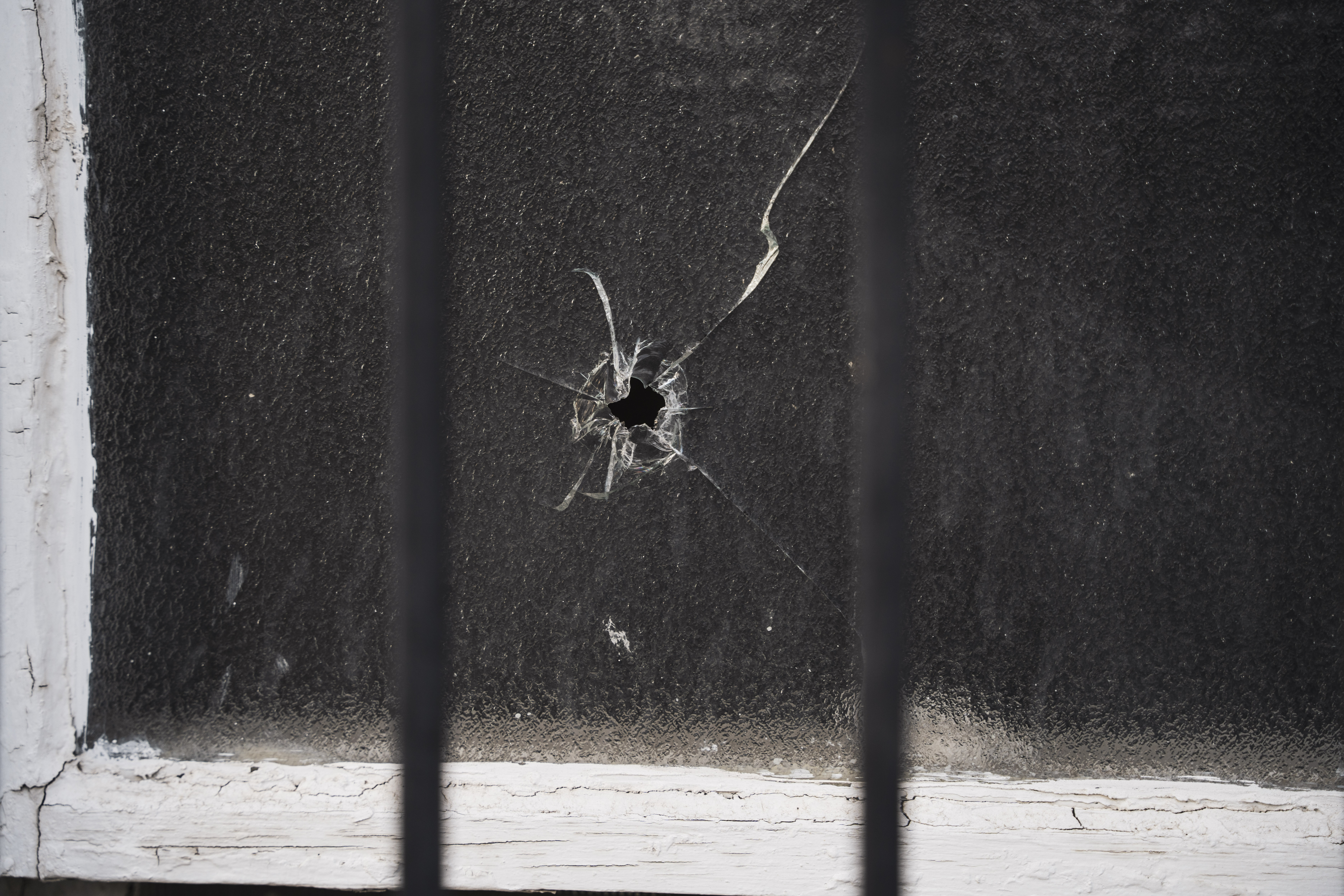
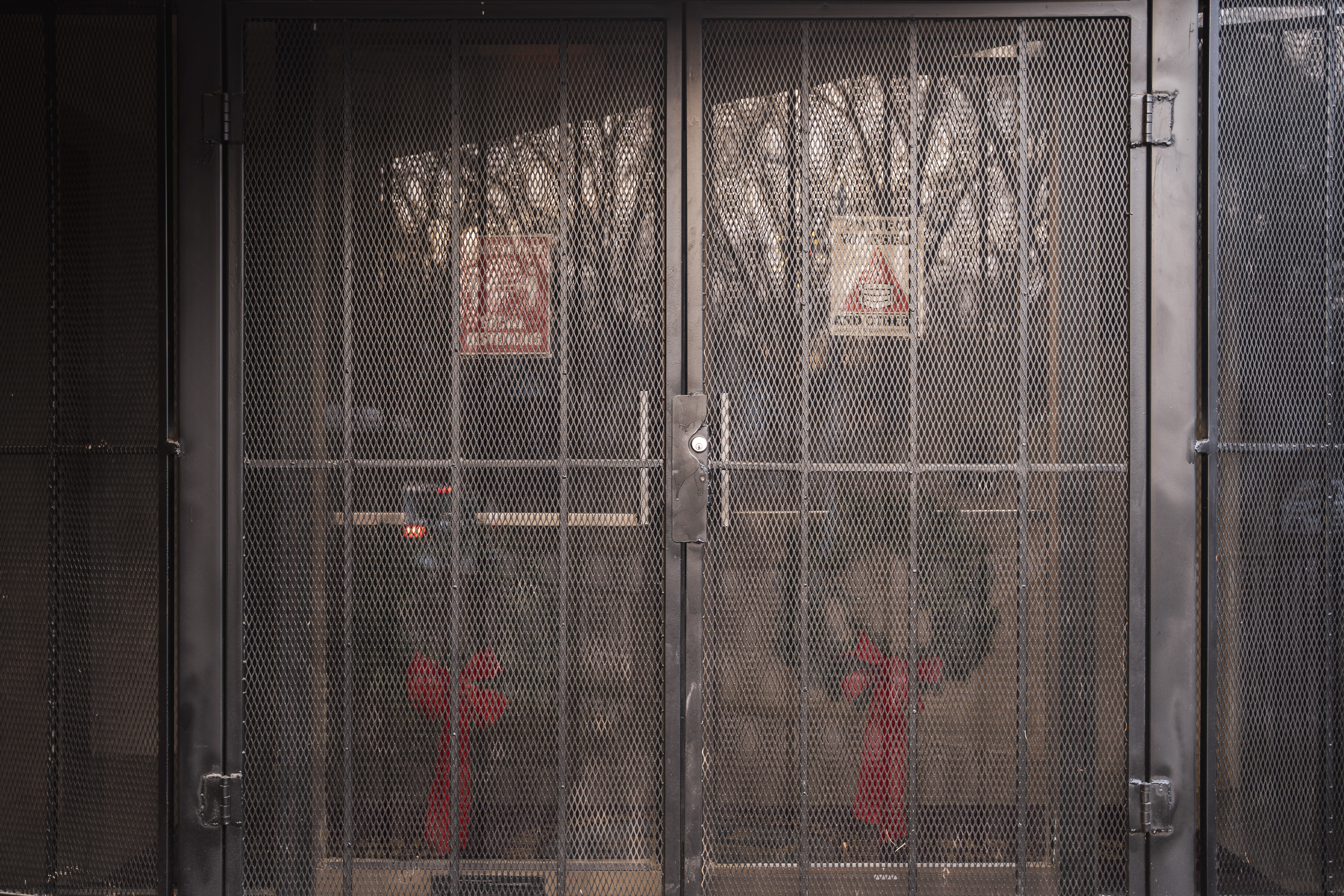
In a September 2022 newsletter, Strickland blamed crime on how “too many of our young people are not achieving academically in school and not properly supervised and mentored when they’re not in school.”
He touted the city’s involvement in Memphis-Shelby County Schools’ partnership with the Boys and Girls Club for after-school activities, an expansion from one high school to ten.
Mauricio Calvo, a member of the MSCS Board who in 2015 served on Strickland’s transition team, said “there’s no working relationship” between Strickland and the system that educates more than 100,000 Memphis children. The city hasn’t paid for public education – except for money required by a 2015 legal settlement – since 2008, leaving funding for MSCS in the hands of the county.
“It’s like the city treats youth as a problem and asks how we keep them busy?” Calvo said. “And that’s just the wrong approach.”
Heather Bullinger said she agrees with Strickland that issues with the courts and the bail system contribute to the city’s crime rates, but that those things mean the solution requires leaders coming together.
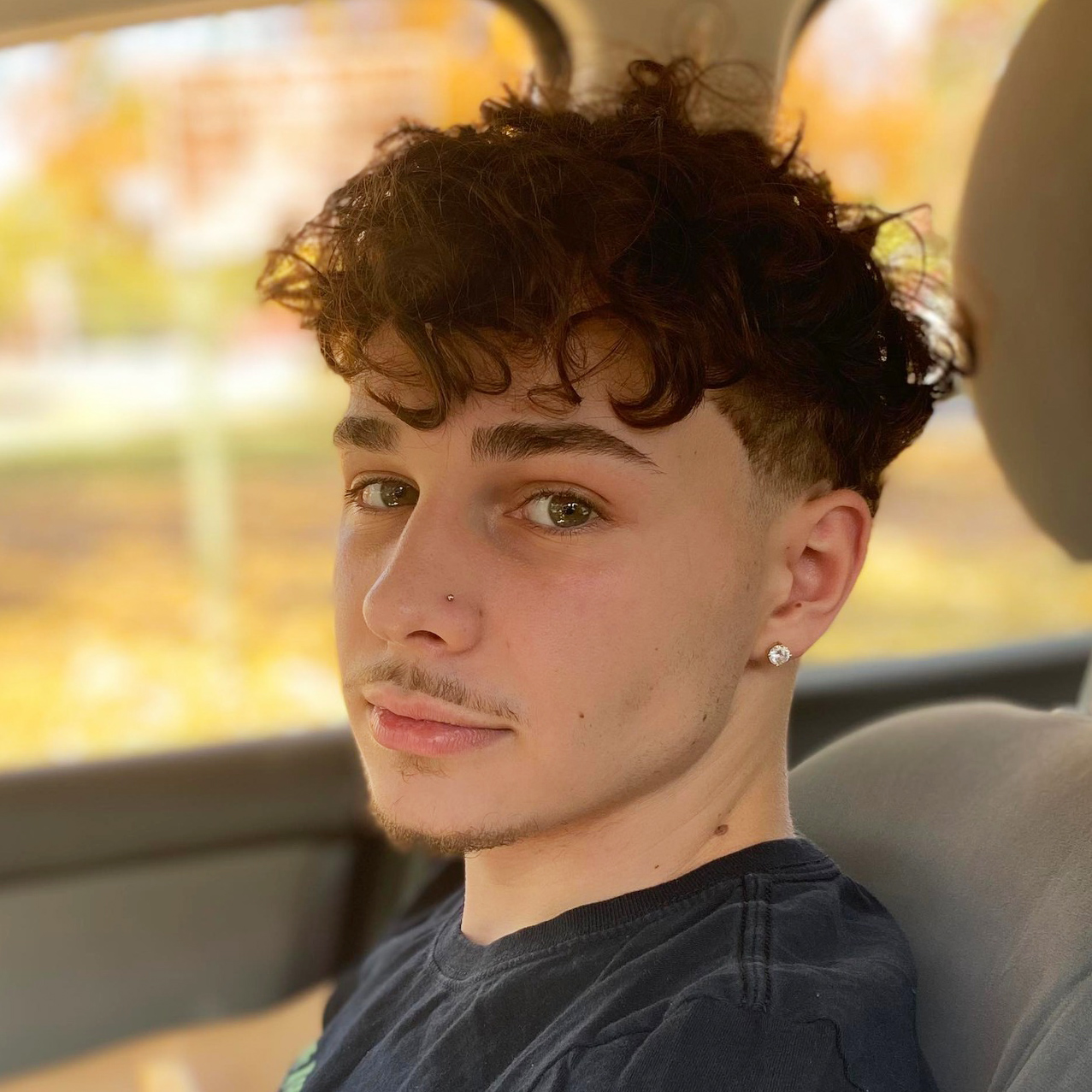
Her son, Preston Cunningham, was killed Jan. 5, 2022. He was 18. No one was arrested for his death until February 2023, and Bullinger said she believes the arrest only occurred because she knows the judicial system and pushed police to continue with the case.
For Bullinger, the issue of city involvement is personal. She receives therapy from the Shelby County Crime Victims & Rape Crisis Center. The center only has two therapists who are free to the families of victims. It receives no direct funding from the city.
The center became fully controlled by the county, without city funding, in 2009, prior to Strickland’s election as mayor. The proposal to move the center came from Strickland, then a city councilman.
“If there are 400 families impacted (by homicide) and you’ve got two therapists, there’s something wrong,” Bullinger said. “If you can’t stop what’s going on immediately, throw funding into things that are gonna help the families get resources to move on and to live.”
Rhetoric that’s ‘counterproductive’
“I’m sick of it, and I know you are too, but the only way it will change is by stopping the ‘Revolving Door’ that is too often our criminal justice system. It will take everyone — city, county, state government, and the general public — working together to do it.”
Strickland, June 16, 2023 newsletter
During Strickland’s time in office, job availability increased after the sharp decline during the height of the COVID-19 pandemic, something Strickland attributed to aggressive recruitment of businesses, while poverty rates declined from 29.8% to 21.4%. But few subjects featured more prominently in Strickland’s newsletter and media appearances than crime.
In the past year, he pointed the finger at the Shelby County District Attorney and the courts, blaming them for a “revolving door.” Shelby County District Attorney Steve Mulroy, a progressive, was elected in 2022 and has received strong criticism from Strickland, who often worked hand-in-hand with Amy Weirich, Mulroy’s Republican predecessor.
Bullinger, the mother who lost her son in 2022, said she sees Strickland’s rhetoric as “counterproductive,” meaning he’s pointing the finger at other individuals and agencies rather than working with them.
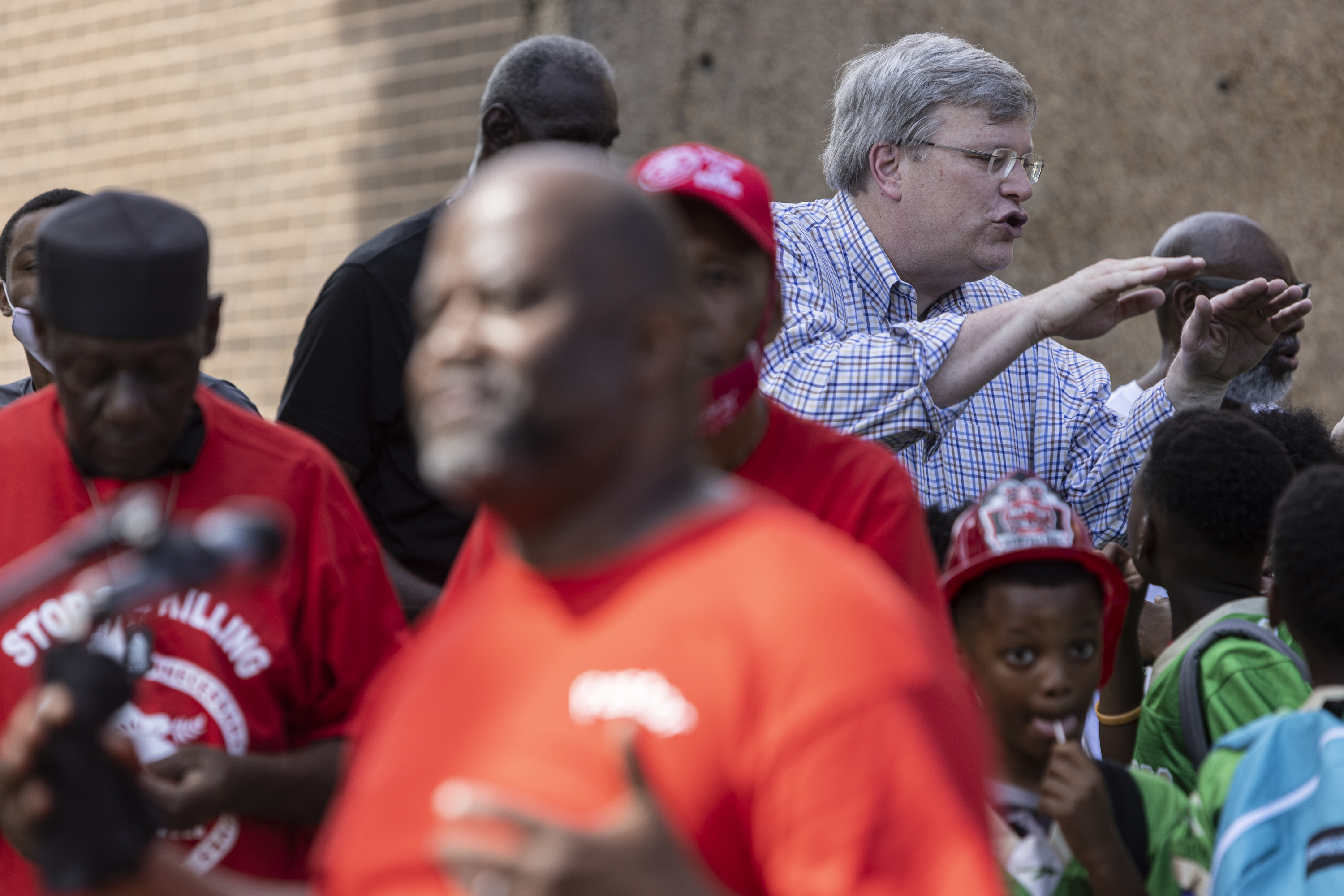
While Strickland’s rhetoric often painted a picture of Memphis as a city riddled with crime, his pleas to the state for stricter gun laws largely fell on deaf ears, something Gabby Salinas, former head of the Shelby County Democratic Party, linked to his alliances with Republicans in state leadership.
A Democrat, Strickland was censured last year by the Shelby County Democratic Party for his support of Republican candidates.
Strickland opposed decreased gun laws at the state level, but wasn’t effective in changing them since he allied himself with the very Republicans who passed or supported those laws, Salinas said.
That, Salinas said, gave Strickland less ground to oppose state efforts that impact Memphis negatively, like the state’s push for universal school vouchers.
“If you are someone that’s trying to stop crimes … why would you align yourself with a party that is going to disproportionately hurt the city (where you hold) the top position?” Salinas asked.
Strickland’s rhetoric around police reform was also inconsistent. After the 2020 death of George Floyd, Strickland created an “Advisory Council to Reimagine Policing” and promised the department would agree to or already practiced reforms such as “8 Can’t Wait.”
In contrast, after Nichols’ death in January, Strickland’s administration opposed several reform efforts by the Memphis City Council, especially those seeking to block traffic stops for low-level offenses.
Calvo, the school board member, said he’s hopeful the next mayor will “be a better salesman or spokesperson for the city,” someone who will focus on Memphis’ positives while collaborating to fix its problems.
“If you don’t believe in something, you’re not investing,” Calvo said. “People run in the St. Jude Marathon because they believe there’s a cure for cancer. … The mayor needs to show up to the streets and (the mayor) need(s) to show up at schools.”
Katherine Burgess is the government accountability reporter for MLK50: Justice Through Journalism. Contact her at katherine.burgess@mlk50.com
This story is brought to you by MLK50: Justice Through Journalism, a nonprofit newsroom focused on poverty, power and policy in Memphis. Support independent journalism by making a tax-deductible donation today. MLK50 is also supported by these generous donors.


